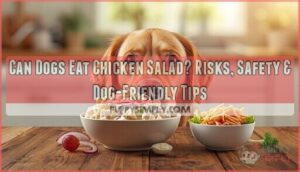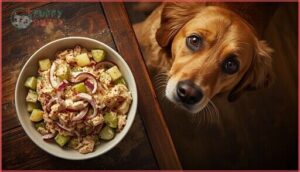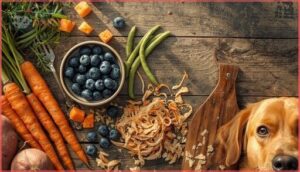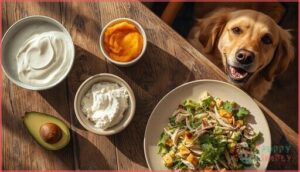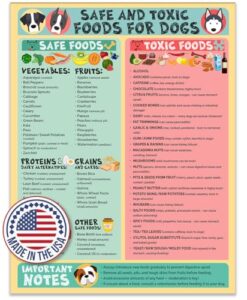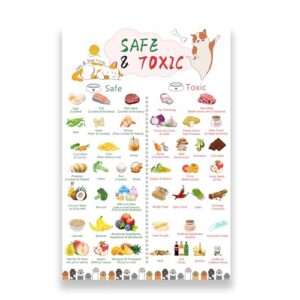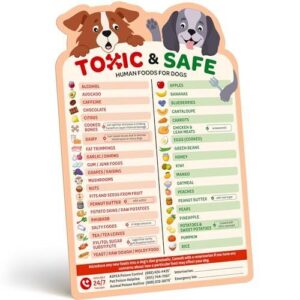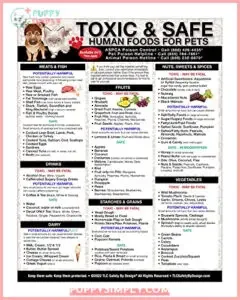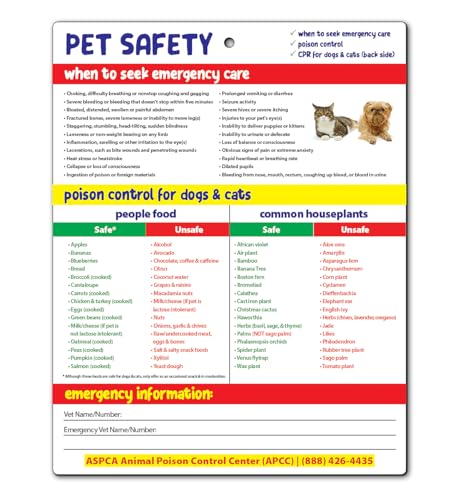This site is supported by our readers. We may earn a commission, at no cost to you, if you purchase through links.
Your dog gives you those big hopeful eyes the moment your lunch hits the table, and chicken salad seems harmless enough—it’s mostly chicken, right? Here’s the thing: that creamy scoop you’re about to share could contain onions, garlic, or grapes, all of which are genuinely toxic to dogs, even in small amounts.
The mayo doesn’t do them any favors either. Knowing what’s actually in your dog’s food—or yours—can mean the difference between a happy pup and an emergency vet visit. A dog-friendly version of chicken salad exists, and it’s easier to make than you’d think.
Table Of Contents
- Key Takeaways
- Can Dogs Eat Chicken Salad Safely?
- Harmful Chicken Salad Ingredients for Dogs
- How to Make Dog-Friendly Chicken Salad
- Top Dog Food Safety Products
- Frequently Asked Questions (FAQs)
- Can my dog eat chicken salad?
- Can dogs eat chicken with mayonnaise?
- Why can’t dogs have lettuce?
- Can dogs eat chicken and mayonnaise?
- Can dogs eat plain chicken salad?
- What salad can dogs not eat?
- Can dogs eat chicken sandwiches?
- How often can dogs eat chicken salad?
- What is the ideal portion size for dogs?
- Can chicken salad be frozen for later use?
- Conclusion
Key Takeaways
- Traditional chicken salad is unsafe for dogs because common ingredients like onions, garlic, grapes, and mayo can cause serious harm—from anemia and kidney damage to pancreatitis.
- You can make a dog-safe version using plain cooked chicken, dog-friendly veggies like carrots and green beans, and a mayo swap like plain Greek yogurt or pumpkin puree.
- Even a dog-friendly chicken salad should be an occasional treat, not a daily meal—stick to 1–3 tablespoons depending on your dog’s size, keeping it within 10% of their daily calories.
- If your dog accidentally eats chicken salad with toxic ingredients, don’t wait for symptoms—call your vet right away, since serious damage can take 24–48 hours to show up.
Can Dogs Eat Chicken Salad Safely?
Chicken salad might seem like a harmless snack to share with your dog, but the answer isn’t as simple as yes or no.
It depends a lot on what’s in it, since even well-meaning homemade mixes can cause nutritional imbalances in homemade dog food without you realizing it.
Most store-bought or homemade versions are packed with ingredients that can seriously hurt your pup. Here’s what you need to know before your dog sneaks a bite.
Common Ingredients in Chicken Salad
Chicken salad sounds simple enough — cooked chicken breast, a creamy mayo base, maybe some crunchy celery or onions, a handful of grapes, and a sprinkle of garlic powder. Some recipes even toss in raisins or nuts as nutritious addons. These are all pretty standard ingredients.
For more details on the essential ingredients for chicken salad, check out this thorough guide. But here’s the thing: what makes chicken salad delicious for you includes several toxic ingredients that aren’t safe for your dog.
Why Traditional Chicken Salad is Risky
So those harmless add-ins? They’re actually a minefield of toxic ingredients.
Onions and garlic cause serious blood cell damage, while mayonnaise loads your dog’s system with fat that can trigger digestive issues or even pancreatitis.
Bacterial risks from improperly stored chicken salad add another layer of danger.
Toss in the nutritional imbalance from all that salt and seasoning, and traditional chicken salad becomes a real problem.
For an in-depth breakdown of harmful ingredients in chicken salad, see this thorough guide.
Signs of Food Toxicity in Dogs
Once those toxic ingredients are in your dog’s system, things can go south fast. Here are food toxicity signs to watch for:
- Gastrointestinal issues like vomiting and diarrhea, often starting within hours
- Lethargy or depression, sudden and noticeable
- Neurological signs like tremors, stumbling, or seizures requiring emergency care
- Kidney-related toxicity symptoms such as increased thirst or reduced urination
Don’t wait — contact your vet immediately.
Harmful Chicken Salad Ingredients for Dogs
Most chicken salads are loaded with ingredients that look harmless but can actually be pretty dangerous for dogs. Some of these are everyday kitchen staples you probably don’t think twice about.
Here’s what to watch out for.
Onions and Garlic
Even a small amount of onions or garlic can quietly wreak havoc on your dog’s health. These toxic ingredients cause oxidative stress on red blood cells, leading to Heinz body anemia — a serious anemia risk most owners never see coming.
Even tiny amounts of onions or garlic can silently destroy your dog’s red blood cells, causing life-threatening anemia most owners never anticipate
What’s trickier? Signs of garlic poisoning or onion allergy may not show up for several days.
| Ingredient | Toxic Dose |
|---|---|
| Onion | ~5g per kg body weight |
| Garlic | ~1g per kg body weight |
Grapes and Raisins
Grapes and raisins are a sneaky danger hiding in many chicken salads — and the risks to dog health are no joke. Grape toxicity and raisin poisoning can cause serious kidney damage, targeting the kidneys’ filtering cells.
Keeping your pup well-hydrated after any accidental exposure can support kidney function, and a best water fountain for puppies makes it easy to encourage steady drinking throughout the day.
Since raisins are more concentrated, even a small handful carries heavy toxic risks. Signs like vomiting and lethargy can hit within hours. Canine nutrition has no room for these fruit risks.
Mayonnaise and High Fat Content
Think of mayonnaise as the silent troublemaker in chicken salad — its fat content risks hitting your dog’s digestive system hard. High-fat foods are a well-known trigger for pancreatitis, causing vomiting and real abdominal pain.
Fatty acid effects also strain a small dog’s daily fat allowance fast. Healthier binders like plain Greek yogurt make smarter mayonnaise alternatives, protecting dog health and nutrition without the food toxicity baggage.
Salt and Seasonings
Salt might seem harmless, but it’s one of the sneakiest seasoning risks hiding in chicken salad. Spice blends, flavor enhancers, and garlic or onion-based toxic compounds make things worse fast.
Sodium toxicity can cause:
- Vomiting and diarrhea
- Tremors or seizures
- Dangerous dehydration
Skip all seasoning entirely — safe ingredients need zero spice blends to taste good to your dog.
Toxic Nuts and Add-ins
Crunchy additives might seem like innocent texture boosters, but some nuts are flat-out dangerous for dogs.
Macadamia nut toxicity is surprisingly fast — signs like weakness, vomiting, and tremors appear within 12 hours. Walnut allergies and general food toxicity from mixed nut blends are real risks too.
When building a dog-friendly recipe, always verify your safe ingredients carefully.
| Nut | Risk Level | Symptoms |
|---|---|---|
| Macadamia | High | Tremors, weakness |
| Walnut | Moderate | GI upset, pancreatitis |
| Peanut (plain) | Low | Generally safe |
How to Make Dog-Friendly Chicken Salad
Good news: you don’t have to cut chicken salad out of your dog’s life entirely. With a few smart swaps, you can whip up a version that’s actually good for them.
Here’s what you’ll need to keep in mind.
Using Plain, Cooked Chicken
Plain cooked chicken is the backbone of any dog-friendly chicken salad — and honestly, it’s one of the best protein sources you can offer. With about 30 grams of protein per 100 grams, it genuinely backs canine dietary needs.
- Cook to 165°F to kill bacteria
- Remove all skin and visible fat
- Boil, bake, or poach — no seasoning
- Remove every bone before serving
- Refrigerate and use within 3–4 days
Dog-Safe Vegetables and Fruits
Once you’ve got your chicken sorted, adding the right mix of dog-friendly foods turns a simple meal into a nutrient-packed treat.
Carrots and green beans are fiber rich foods that support digestion and canine dietary needs. Blueberries bring fruit safety and antioxidant benefits, while sweet potato adds vitamin sources and nutrient balance — all excellent healthy snacks for dog nutrition and health.
Healthier Alternatives to Mayonnaise
Mayonnaise is basically pure fat — nearly 680 calories per 100 grams — and your dog really doesn’t need that. Luckily, a few swaps make chicken salad both creamy and safe.
- Greek yogurt — only 61 calories per 100g, rich in yogurt benefits and protein
- Pumpkin puree — zero fat, packed with vitamin A, great for digestion
- Cottage cheese — creamy texture with 11g of protein per 100g
- Avocado mix — heart-healthy fats, though use sparingly
These keep dog nutrition and health on track while avoiding safe and toxic foods for dogs pitfalls.
Portion Control and Moderation
Even the healthiest chicken salad can cause problems if you overdo it.
Treats should cover no more than 10 percent of your dog’s daily calories — that’s roughly 40 to 60 calories for a 20-pound dog.
Adjust portions based on size, introduce it gradually, and offer it once or twice a week. Obesity risks are real, and canine nutrition thrives on balance, not generosity.
When to Consult Your Vet
Moderation helps, but it doesn’t cover everything. If your dog eats chicken salad with onions, garlic, or grapes, don’t wait for toxicity symptoms to show up — call your vet right away.
Serious damage can take 24 to 48 hours to appear. For urgent consultation on vomiting, lethargy, or pale gums, skip the wait-and-see approach. Veterinary guidance is always worth the call.
Top Dog Food Safety Products
Keeping track of what’s safe food and what’s not for your dog can feel overwhelming, especially with so many human foods in the mix.
A simple reference tool on your fridge can make that job a whole lot easier. Here are some of the best dog food safety products worth having at home.
1. Dog Food Safety Chart Magnet
Think of this as your kitchen’s cheat sheet for dog safety. The Dog Food Safety Chart Magnet from Lone Star Art is an 8.5″ x 11″ waterproof magnet that sticks right to your fridge, putting a clear list of safe foods and toxic foods exactly where you need it.
It flags dangers like onions, garlic, and grapes — the very things hiding in chicken salad. Color-coded sections and bold fonts make it easy to scan fast, even mid-cooking.
| Best For | New and experienced dog owners, veterinarians, and anyone who wants a quick, reliable reference for what their pup can and can’t eat. |
|---|---|
| Material | Plastic |
| Mounting Type | Magnetic |
| Safe Foods List | Yes |
| Toxic Foods List | Yes |
| Weight | 3.03 oz |
| Dimensions | 8.5×11 in |
| Additional Features |
|
- Waterproof and humidity-resistant, so it holds up in a busy kitchen without fading or peeling.
- Easy-to-read format with a dog-friendly treats chart and toxic foods guide all in one place.
- Strong magnet keeps it firmly on the fridge, right where you need it most.
- At 8.5″ x 11″, it might not fit well in tighter spaces or on non-magnetic surfaces.
- Doesn’t cover every possible food, so you may still need to do some extra research for less common items.
- No digital version, which makes it harder to check on the go or away from home.
2. Magnetic Safe Foods Guide for Dogs and Cats
If you share your kitchen with both a dog and cat, this one’s a lifesaver. The Blirik Magnetic Safe Foods Guide covers both species in one colorful, easy-to-read chart — no guessing which list applies to which pet.
At 11.54 x 7.6 inches, it’s big enough to read at a glance without crowding your fridge. The soft magnet backing holds firm, and the visual layout makes it simple for kids or pet sitters to follow too.
| Best For | Pet owners with both dogs and cats who want a quick, reliable reference for safe and toxic foods right on the fridge. |
|---|---|
| Material | Soft Magnet |
| Mounting Type | Magnetic |
| Safe Foods List | Yes |
| Toxic Foods List | Yes |
| Weight | 8.4 oz |
| Dimensions | 11.54×7.6 in |
| Additional Features |
|
- Covers both dogs and cats in one chart, so you’re not juggling two separate guides
- Big enough to read at a glance, and the visual design works well for kids and pet sitters too
- Sturdy magnet backing keeps it in place without falling or sliding
- Some users found the text a bit small or hard to read up close
- Only works on magnetic surfaces, so placement options are limited
- May not cover every possible food, so it’s not a complete substitute for vet advice
3. Dog Food Safety Magnet Chart
Emmy’s Best keeps it refreshingly simple. This rubber magnet — 9.76 x 6.65 inches — gives you a clear, at-a-glance list of what dogs can and can’t eat, right on your fridge where you actually need it.
It’s built for everyday kitchen life, with durable vinyl construction that wipes clean easily. There’s even space to jot down your vet’s number, which is a small detail that makes a big difference when you’re in a hurry. Great for pet sitters and kids too.
| Best For | New dog owners, pet sitters, and anyone with kids in the house who needs a quick, reliable reference for what’s safe to feed the dog. |
|---|---|
| Material | Rubber |
| Mounting Type | Magnetic |
| Safe Foods List | Yes |
| Toxic Foods List | Yes |
| Weight | 5 oz |
| Dimensions | 9.76×6.65 in |
| Additional Features |
|
- Keeps emergency poison control and vet numbers right where you need them — on the fridge
- Durable, wipe-clean vinyl that holds up in a busy kitchen
- Simple and clear enough for kids and pet sitters to use without any guidance
- Some users found the size a bit small for easy reading
- Doesn’t cover every food item you might wonder about
- Won’t account for your specific dog’s allergies or sensitivities
4. Toxic Food List Magnet for Pets
In terms of keeping pets safe, this magnet from TLC Safety By Design doesn’t mess around. At 8.5 x 11 inches, it’s big enough to actually read from across the kitchen — and it covers the toxic foods that matter most, from grapes and onions to toxic nuts.
You get three animal poison control hotlines printed right on it, so you’re never scrambling during a scare. It even comes with a bonus Emergency Contact List. A smart pick for new pet parents or anyone with kids in the house.
| Best For | New pet owners, families with kids, and pet sitters who want quick, easy access to pet safety info right in the kitchen. |
|---|---|
| Material | Vinyl |
| Mounting Type | Magnetic |
| Safe Foods List | Yes |
| Toxic Foods List | Yes |
| Weight | 4.2 oz |
| Dimensions | 8.5×11 in |
| Additional Features |
|
- Three poison control hotlines printed right on it — no googling in a panic
- Big, easy-to-read size (8.5 x 11) with a bonus Emergency Contact List included
- Great for educating kids and guests on what not to feed the pets
- It’s large, so it takes up a decent chunk of fridge space
- Only one magnet, which might feel limited if you have multiple pets or a big household
- Doesn’t work on non-magnetic surfaces, and some folks may just prefer looking this stuff up online
5. Pet Safety Fridge Magnet Chart
This one’s a real all-rounder. The Safety Magnets Pet Safety Fridge Magnet Chart packs emergency poison info, Red Cross CPR steps for both dogs and cats, and a fill-in section for your own vet’s number — all on a durable, laminated metal magnet.
It’s wipe-clean, sticks securely to any fridge door, and displays clearly at 11 x 8.5 inches. Perfect for pet sitters, new puppy parents, or anyone who just wants that extra layer of confidence in the kitchen.
| Best For | Pet owners, sitters, and dog walkers who want quick access to emergency info without digging through their phone. |
|---|---|
| Material | Metal |
| Mounting Type | Magnetic |
| Safe Foods List | Yes |
| Toxic Foods List | Yes |
| Weight | 1.16 oz |
| Dimensions | 11×8.5 in |
| Additional Features |
|
- Covers the big stuff — poison info, CPR steps for dogs and cats, and a spot to write in your vet’s number
- Laminated and wipe-clean, so it holds up in a busy kitchen
- Sticks right on the fridge where anyone in the house can see it fast
- Some folks feel it’s a little small for the price
- Return shipping costs can make it a hassle if it’s not what you expected
- If you’ve already got a lot on your fridge, the size might feel limiting
Frequently Asked Questions (FAQs)
Can my dog eat chicken salad?
Most chicken salads aren’t safe for dogs. The plain chicken itself is fine, but the mix-ins — onions, garlic, mayo, seasonings — can upset their stomach or worse.
Can dogs eat chicken with mayonnaise?
Like a rich dessert that’s tempting but hard on the stomach, chicken with mayonnaise isn’t ideal for dogs.
The high fat content can trigger digestive upset, and seasoned mayo may hide harmful ingredients like onion or garlic.
Why can’t dogs have lettuce?
Lettuce itself isn’t toxic, but it’s mostly water with very little nutrition. In large amounts, that extra fiber can upset your dog’s stomach, causing loose stools, gas, or bloating.
Can dogs eat chicken and mayonnaise?
Plain chicken is fine for dogs, but skip the mayo. It’s loaded with fat and can upset their stomach or trigger pancreatitis.
Stick to plain, unseasoned chicken as a safe, healthy treat.
Can dogs eat plain chicken salad?
Technically, yes — but only if it’s truly plain cooked chicken. That means plain cooked chicken, no seasoning, no dressing, no extras.
Even then, keep portions small and treat it as an occasional snack, not a meal.
What salad can dogs not eat?
Most salads dogs can’t eat include Caesar, Greek, Cobb, and chef salads. Toxic toppings like onions, grapes, garlic, and rich dressings make them unsafe, even in small bites.
Can dogs eat chicken sandwiches?
Most chicken sandwiches aren’t safe for dogs.
The fried chicken, sauces, and seasonings are too fatty and salty, and many contain hidden garlic or onion powder, which can seriously harm your dog.
How often can dogs eat chicken salad?
For a dog-safe version, once a week is a reasonable treat — not a daily staple.
Keep small portions, count those calories toward their daily limit, and always watch for any tummy troubles after.
What is the ideal portion size for dogs?
Portion size depends on your dog’s weight. A 20-pound dog should stick to just 1–2 tablespoons of dog-friendly chicken salad, while a 50-pound dog can handle 2–3 tablespoons occasionally.
Can chicken salad be frozen for later use?
Yes, you can freeze chicken salad — but expect some texture changes.
Mayo-based versions often turn watery after thawing. Stick to a 1–3 month window and thaw it safely in the fridge overnight.
Conclusion
Think of your dog as a trusting guest at your table—they’ll eat whatever you serve without question, putting their wellbeing entirely in your hands. That’s a quiet responsibility worth honoring.
When someone asks “can dogs eat chicken salad,” the honest answer is: not the kind you’re eating. But a simple version? That’s a gift you can give them daily. Know what’s in the bowl, and you’ll never have to guess about the consequences.

